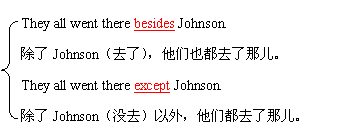字号: 默认 大 中 小
主讲:黄冈中学优秀英语教师 杨帆
一、知识概述
1.学习和掌握本单元出现的生单词、词组和句型。
2.学习和掌握be supposed to do sth.与be expected to do sth.的固定句型用法。
3.学习和掌握It +be+adj.+to do sth.的固定句型用法。
二、单元重难点解析
1.In China, you’re not supposed to stick your chopsticks into the food.
在中国,你不应该把筷子插入食物中。
(1)stick…into/in…意为“把……插入……”。
e.g.Don't stick your fork into your food.
别把叉子插入食物中。
(2)chopstick为名词,意为“筷子”,常用复数形式。
e.g.We usually eat noodles with chopsticks.
我们通常用筷子吃面条。
英语中常见的以复数形式出现的名词有:noodles(面条),dumplings(饺子),trousers(裤子),pants(长裤),shorts(短裤),gloves(手套),shoes(鞋子),socks(袜子),glasses(眼镜)等。
2.In China, it’s impolite to use your chopsticks to hit an empty bowl.
在中国,用筷子敲空碗是不礼貌的。
empty此处用作形容词,意为“空的;空洞的”。其反义词为full(满的)。
e.g.The bottle is empty.
这个瓶子是空的。
This is an empty box.
这是一个空盒子。
拓展:empty用作及物动词,意为“排空,倒空”。其反义词为full(装满,填满)。
e.g.Just now he emptied the bottle.
刚才他把瓶子倒空了。
3.I was a bit nervous before I arrived here, but there was no reason to be.
我在到这里之前有点儿紧张,但那是没理由的。
e.g.There was/is no reason to do sth. 意为“没有理由做某事”。
e.g.There is no reason to be late.
没有理由迟到。
拓展:have no reason to do sth. 意为“没有理由做某事”。
e.g.You have no reason to say so.
你没有理由这么说。
4.They go out of their way to make me feel at home.
他们尽力使我感到宾至如归。
(1)go out of one’s way意为“特地;格外努力”。
e.g.They went out of their way to help her.
他们竭力帮助她。
He went out of his way to teach me to learn English well.
他尽力教我学好英语。
(2)make…feel at home意为“使(某人)感到宾至如归”。
e.g.His kindness makes me feel at home.
他的仁慈使我感到宾至如归。
拓展:make sth. for sb.= make sb.sth. 意为“为某人制作某物”。
e.g.She made a dress for me.
=She made me a dress.
她给我做了一件连衣裙。
5.So she actually learned how to make Chinese food!
所以她竟然学习如何做中国菜!
how to make Chinese food为“疑问词+动词不定式”结构,在句中作learn的宾语。
e.g.I want to learn how to make dumplings.
我想学习如何包饺子。
拓展:动词不定式与疑问词who,which,when,where,how,what等连用时,常作tell,
show,know,1earn,teach,explain,decide等的宾语,构成“疑问词+动词不定式”结
构,可转换成宾语从句。
e.g.He didn’t know what to say.
=He didn’t know what he should say.
他不知道该说什么。
6.Another example is that you’re not supposed to eat anything with your hands except bread, not even fruit.
另一个例子是除了面包外,你不应该用手拿着任何东西吃,甚至水果也不行。
except为介词,意为“除……之外”,其后可接名词、代词、从句等,表示把某人或某物从某一范围内排除出去,即不包含在内。
e.g.They all went to the museum last Sunday except him.
除了他以外,上周日他们都去博物馆了。
We go there every day except Sunday.
除了星期天,我们每天都去那儿。(星期天不去那儿)
辨析:besides和except
besides常用于表示“除了……之外(还有)”的含义,而except的意思常与之相反,即“除了……”,是“减去,不再有”。
e.g.There were three more visitors besides me.
除我之外,还有三位访客。(即我也是“访客”)
Everybody except John was able to answer the question.
除了约翰之外,大家都能回答这个问题。
试比较下面这组句子:

7.I have to say that I find it difficult to remember everything, but I’m gradually getting used to it.
我不得不说,我发现记住所有的事情是困难的,但是我正在逐渐习惯这些事情。
(1)“find it + adj. + to do sth.”意为“发现做某事是……的”。find后接复合宾语,其中it此处作形式宾语,真正的宾语是后面的动词不定式to do sth.,形容词在句中作宾语补足语。
e.g.I find it very interesting to learn English.
我发现学英语很有趣。
I found it hard to work with him.
我发现和他一起工作很难。
get used to相当于be used to,意为“习惯于……”,其中to为介词,其后可接名词、代词或动词-ing形式。
e.g.She gets/is used to getting up early.
她习惯于早起。
8.Let me give you some suggestions and advice about Chinese customs.
让我给你一些关于中国风俗的建议和意见。
(1)let sb. do sth.意为“让某人做某事”。
e.g.Let me help them.
让我帮他们吧。
(2)suggestion此处用作可数名词,意为“建议”。其动词形式为suggest,意为“建议”。
e.g.I have a suggestion to make.
我有个建议要提。
I went there at/on your suggestion.
我是根据你的建议到那里去的。
(3)advice不可数名词,意为“建议;意见”。表示“一条建议”应用a piece of advice,而不能说an advice。其常用短语还有:
ask for sb.’s advice 向某人征求建议
give sb. some advice on… 在……方面给某人提出一些建议
accept/follow/take sb.’s advice 接受某人的建议
9.In many countries, it is impolite to show up at someone’s house for the first time with empty hands.
在许多国家,第一次拜访别人家空着手是不礼貌的。
show up意为“出席;露面”,相当于appear。
e.g.We waited for him for a long time, but he didn’t show up.
我们等了他很长时间,但他没有露面。
拓展:有关show的常见短语:
show off 炫耀,卖弄
show sb. around 带领某人参观
on show 展出,展览
10.It+ be +adj.+ to do sth.句型
(1)It + be +adj. +to do sth. 意为“做某事是……的”,it为形式主语,真正的主语是后面的动词不定式(短语)。因动词不定式(短语)作主语较长,而谓语部分相对较短,用it代替后就避免了“头重脚轻”的现象。
e.g.I think it’s important to sleep eight hours a night.
我认为每晚睡8个小时很重要。
When we see each other, it’s polite for boys to shake hands and for girls to kiss each other on the side of the face.
当我们见到对方时,男孩们握手,女孩们互相亲吻脸的一侧是有礼貌的。
In Switzerland, it’s very important to be on time.
在瑞士,守时是非常重要的。
I always leave the house early to avoid heavy traffic because I think it’s impolite to keep others waiting.
我总是早早离开家以避免交通拥挤,因为我认为让别人等待是不礼貌的。
(2)表示“(对某人来说)做某事是……的”,用句型It +be + adj. +for/of sb. +to do sth.,其中sb.为动词不定式to do sth. 的逻辑主语。二者的具体用法为:
① It +be +adj. +for sb. +to do sth. 此句型中的形容词为描述事物特征的词,如 difficult,important,easy,hard,necessary,possible,dangerous,impossible等,是 说明动词不定式的。
② It +be +adj.+ of sb. +to do sth. 此句型中的形容词为描述人物品质及性格特征的词,如clever,foolish,good,kind,nice,polite等,用来说明of后的sb。
e.g.It’s hard for me to answer your question.
对我来说回答你的问题很难。
It was foolish of him to go alone.
他单独去太傻了。